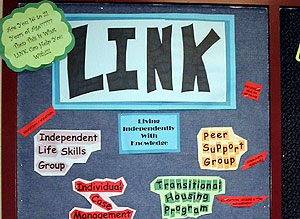|
Audio
Photos
Your Voice
|
Youth programs hard hit by budget cuts
July 16, 2003
Funding for teen programs around Minnesota is dwindling as a result of the state budget crisis. As youth programs statewide reduce their services for things like housing and employment, there's growing concern no one's left to pick up the slack.
Rochester, Minn. — Alier Kang moved to Rochester a few years ago and he's struggled with homelessness ever since. He's slept on crowded floors, couches, and in the back of his car. When it got to be too much, Kang dropped out of high school, temporarily abandoning his dream of becoming a doctor.
Kang is Sudanese and he tells his story in a quiet heavily accented voice. Kang says initially he lived with his aunt in a cramped two-bedroom apartment.
"There were about eight people in the house and me nine, so I said it wouldn't work," explains Kang. "There's no place to sleep."
So Kang contacted the Link program. It specializes in helping young people like Kang -- teens facing homelessness, that come from troubled, unstable backgrounds. About a third of the teens in the program have young kids of their own. All are classified as "at risk." But according to organizers, the fact the teens participate in the program is a sign they want to get lives on track.
Link's based in Rochester, but its efforts extend across a four county region in southeastern Minnesota.
Kang says after meeting with a case manager his life began to turn around. Eventually he even had enough money to help support destitute relatives back in Africa.
"We sat down and figured some things out," says Kang. "He gave transitional housing when I was homeless and I started working and start sending money back home to support my brothers and sisters."
Like other non-profits, Link's bracing for major budget cuts in the coming months. Its $200,000 budget comes from the state. And as much as 60 percent is expected to disappear.
Teresa Byland oversees the program which is housed at the YMCA in Rochester.
"These cuts are across the board. They're affecting government agencies as well as non-profits and the losers are the kids that we serve," says Byland. "Last summer we served a 17 year old who was living in a car with a three-month-old baby. I mean how can we turn a kid like that away?"
Link's transitional housing program is expected to be the hardest hit, while support groups and life skills training will likely continue.
Byland says last year the program helped 70 teens secure housing. In many cases Link supplies money for a security deposit and first months rent. All told the investment is usually more than $1,000 per individual. In exchange the teen signs a contract pledging to meet a list of requirements including to stay in school.
Byland says the budget cuts will have very real consequences.
"You know these are a great bunch of kids," says Byland. "Every time I get to see them I'm reminded how down to earth and hard working and just what great kids they are. They don't deserve this."
For his part Alier Kang's already felt the impact. His Link caseworker has been laid off and Kang is about to homeless again -- only this time Link can't help.
With other local non-profits facing the same budget crunch, Teresa Byland says it's unclear where the teens can turn for aid. Even emergency funds in Olmsted County earmarked for housing services are gone.
Up in northwestern Minnesota a teen employment program is also feeling the pinch. Rural Minnesota CEP works in 19 counties, using state dollars to put young people to work each summer. Typically the program begins in June, but this year the program launched a month late. The number of participants was cut in half, to 560 teens.
Larry Buboltz directs CEP. He says last year 40 percent of the participants came from homes where the parents were on public assistance, with little employment history. He says the summer program is an opportunity to break that cycle.
"This as much, as close to, a work situation possible," says Buboltz. "The sooner you learn those life skills, those work skills and many of the soft skills that are connected with that - by soft skills I mean showing up on time, working with a supervisor, working in team settings, attitude about work and all of those types of things - those are really crucial."
Buboltz says the CEP summer program is a small price for the state pay compared to lifetime of welfare and food stamps. He says he has his fingers crossed the program can continue to limp along next year since more cuts may be on the way.
|
News Headlines
|
Related Subjects
|

